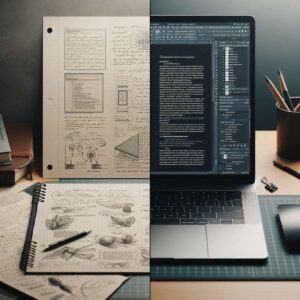Blogpost written by Elif Nur Öztürk and Mustafa Enes Gedikoğlu
Key Points:
- Taking notes on a laptop might impair your learning, as it often leads to passive transcription rather than active engagement with the material.
- Simply writing down exactly what the lecturer says doesn’t really help you understand the topic better.
- Failing to review your notes can make it challenging to retain and apply the information later.
Imagine walking into a classroom. How many people are taking notes longhand, and how many are using laptops? In today’s digital age, laptops provide easy access to the vast world of the internet. But does using laptops for note-taking genuinely enhance our learning, or does it hinder the process? With their potential for multitasking, laptops can often become a source of distraction, drawing attention away from the lecture. In this blog post, we will examine the effectiveness of longhand note-taking versus laptops, guided by insights from the study The Pen Is Mightier Than the Keyboard: Advantages of Longhand Over Laptop Note Taking.

Laptops are particularly appealing for note-taking in lectures, as they enable students to take note of content with ease. Mueller and Oppenheimer explored whether laptops or longhand note-taking is more effective for learning.
Their study explored two main ideas about how note-taking helps with learning. One idea is that taking notes helps you process and understand the material better as you write. The other idea is that having notes to review later is useful, even if you didn’t write them yourself. The researchers designed their approach around these ideas, running three different studies to dig deeper into them.
Exploring the Impact of Note-Taking Methods on Learning and Retention
- Laptop vs. Longhand: Which Note-Taking Method Wins?
Students using laptops for note-taking tended to produce higher word counts, often transcribing lectures verbatim which means laptop users tend to type lectures word-for-word. In contrast, those using longhand notes recorded fewer words but thought more deeply about the material. While both groups performed similarly on factual questions that required basic recall, longhand note-takers significantly outperformed their laptop-using peers on conceptual questions, which demanded a deeper understanding of the material. - Typing vs. Thinking: Does Transcribing Notes Hurt Your Learning?
Longhand note-taking, which naturally resulted in fewer words and less verbatim copying, led to better outcomes on tasks which requiring deeper understanding, like analyzing and applying ideas compared to other methods. On the other hand, instructing laptop users to avoid word-for-word transcription had little effect. They still copied notes verbatim, showing no significant performance difference from uninstructed participants, which might be due to the nature of laptop note-taking that encourages fast, word-for-word transcription over thoughtful summarization. - Does Your Memory Prefer Reviewed Longhand Notes Over Typed Ones?
When people reviewed their notes before a test, those who wrote by hand were more successful than laptop note-takers. This demonstrates that longhand notes offer greater benefits, making them more effective tools for learning. - Unreviewed Notes: Do They Actually Help You Learn?
Interestingly, without studying, no significant differences between laptop and longhand note-taking were observed. This highlights the importance of not only how notes are taken but also how they are made use of.
What’s the Plan: Back to Pen and Paper?
Not necessarily. The key takeaway isn’t to stop using laptops for note-taking, but rather to be mindful of potential drawbacks. To improve learning process:
- Avoid Word-for-Word Transcription: When taking notes on a laptop, focus on capturing the main ideas rather than taking word to word notes. This encourages better engagement and understanding.
- Use Generative Note-Taking Methods: Instead of simply writing down what you hear, try to summarize the content in your own words. Techniques like drawing diagrams or visualizing concepts can also enhance learning.
- Be Intentional: Whether using a laptop or pen and paper, being conscious of your note-taking style and its impact on your learning can help you retain and apply information more effectively.
- Study Your Notes: Last but not least, the act of studying your notes is crucial for retention. Notes that aren’t reviewed don’t fully contribute to the learning process.
In today’s world, we often embrace what technology offers without questioning its drawbacks or benefits. But sometimes, traditional methods may be more effective than we realize. This study shows that learning isn’t just about gathering information—it’s about how we engage with it. When using a laptop, approach note-taking with intention and focus on capturing key ideas instead of transcribing everything word by word. And if you’re drawn to modern tools, perhaps a tablet with a pen could offer the best of both worlds: the flexibility of digital notes with the cognitive benefits of hand-written engagement.
What do you think? How do you approach note-taking, and are there ways you could make it work better for you?
References
Paper notebooks vs. mobile devices for note-taking Mueller, P. A., and Oppenheimer, D. M. (2014). The pen is mightier than the keyboard: advantages of longhand over laptop note taking. doi.org/10.1177/0956797614524581